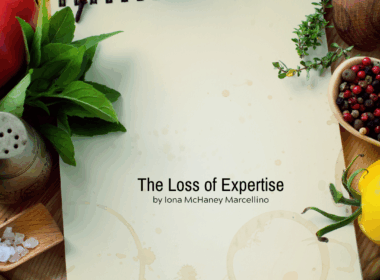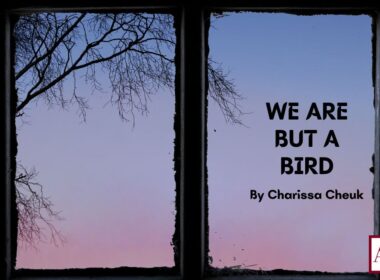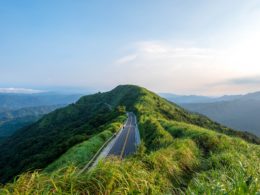By Deborah Kartheiser
Three weeks after I’d moved to the city where I live now, an old friend came to visit. I took her for a drive, showing her this quirky Midwestern river town whose evolution can be traced through a strange assortment of five-point intersections, defunct railroad lines, and streets zigzagging with the waterway. She was astounded.
“How do you know your way around already? Aren’t you scared you’ll get lost?”
Her reaction puzzled me. I’d been sometimes annoyed, sometimes amused as I’d explored my latest “new hometown.” But scared? That hadn’t occurred to me. Sure, I got lost a lot—but with the help of a map and some homing instincts, I always found my way back. It was fun, not scary.
That concept of fearless exploring is a natural process for me. With each move or vacation trip I rush out to learn the lay of the land, just as I’ve been doing all my life.

It is a very useful part of my heritage as a third culture kid.
So are my abilities to bridge cultural gaps, treasure diversity, experiment with new foods and new languages, and enjoy rather than dread traveling alone.
Of course there are some less-useful pieces of that heritage—like my qualms at deep-down trust in relationships, and a tendency to rush into things rather than patiently waiting for better timing.
But as I think about how we can use our unique cultural heritage as third culture kids, I am very excited and encouraged, because it offers us so much flexibility and so many options.
We have a unique heritage
Webster’s Ninth Collegiate Dictionary defines “heritage” in four ways: property that descends to an heir; something transferred by or acquired from a predecessor; tradition; or something possessed as a result of one’s natural situation or birth.
The concept of “heritage” itself has changed over the decades.
‘Heritage’ is an old word, drawn from the vocabulary of those old societies in which primary values derived from ancestral relationships. In its original sense, heritage was the property which parents handed on to their children, although the word could be used to refer to an intellectual or spiritual legacy as well. In the nineteenth and early twentieth centuries, as new nation-states fought for legitimacy, people began to speak of a ‘national heritage’ as a body of folkways and political ideas on which new regimes founded their sense of pride and legitimacy.
In our time heritage has come to refer to things both more tangible, and more fragile, than the imperishable ideals of our ancestors. By the 1960s the two ideas—heritage as ideals and heritage as things—were becoming more closely intertwined. (Graeme Davison, A Heritage Handbook, 1991)

But what is our own TCK heritage? I think it differs in some crucial ways from more traditional concepts of heritage tied to a geographic home, place, or ancestry.
As people who grew up mostly mobile, in different cultural settings, we’ve incorporated into ourselves some of each place and society in which we learned to function. When I think of home, for instance, there are certain places which resonate strongly for me, even though I haven’t been there for years and some of them don’t even exist anymore.
We all have ancestral heritage, too. But many of us spent formative years away from our extended families, so we may not realize how some of our own personal nuances are affected by stuff that came from our grandparents and great-grandparents. I often wonder why my parents decided to venture out to internationally mobile lives after growing up in fairly traditional and conservative US communities. What was it about my forebears that produced such adventurous heirs?
But for us, I think, heritage is more than the sum of our many cultural and ancestral parts.
It is a process, a state of changeable being. The process of adapting, chameleon-like, to different settings or demands; of reinventing ourselves throughout life rather than expecting that we’d remain as constants and others would adapt to us; of seeing our existence as an always-learning journey rather than “arriving” anywhere permanently—this is our heritage.
We are not locked into any particular cultural, geographic, or ancestral heritage. We’re free to weave our own unique heritage from the rich variety that has formed us—free to make what we want of it.
Sometimes I still regret that I missed out on so much of the shared history of my own extended family and nationality. But in another way, because of my TCK heritage, I can appreciate these pieces of myself even more deeply. I can see how they have helped shape me, but I am not locked into conforming with them or rebelling against them. They have no great power over me. They are just a part of the complex person that I am.
Anytime a fellow reporter couldn’t understand a source due to heavily accented English, I was called in.
Leveraging our heritage
We can use this heritage in many different levels of our lives.
Many of my fellow third culture kids have leveraged their heritage when choosing careers. Some have returned to the countries where they grew up to work in missions, military, government, or business careers. Others have chosen to “stay put,” but work in positions where they’re in constant contact with people of diverse cultures, or helping to foster communication and understanding between people of differing backgrounds.
Some of us don’t even realize we’re using our “heritage skills” on the job.
When I was a business reporter at a daily newspaper, I used to drive my fellow employees nuts because I was always playing “the devil’s advocate” (i.e., “a person who expresses a contentious opinion in order to provoke debate or test the strength of the opposing arguments”, according to the Merriam-Webster online dictionary). For me there were not even two sides to the story—there were a lot more. Some of my editors found this frustrating, and it was hard sometimes to decide on a focus. But I think my “outside-the-box” viewpoint helped me to cover issues fairly.
I also developed a reputation: Anytime a fellow reporter couldn’t understand a source due to heavily accented English, I was called in. I was the only person who didn’t have trouble hearing through an accent; I’d been doing it since I was a kid. Lots of times I didn’t even notice.
Such career choices may start with a high commitment toward education, surmised sociologists and anthropologists Dr. Ann Baker Cottrell and Dr. Ruth Hill Useem from in-depth research in the early 1990s on 400 adult third culture kids (ATCKs). Their findings were first published in NewsLinks, the newspaper of International Schools Services, in 1993.
One of the most notable characteristics of ATCKs is their high achievement…. Only 21 percent of the American population…have graduated from a four-year college. In sharp contrast, 81 percent of adult TCKs have earned at least a bachelor’s degree.
Majors chosen by a quarter of this sample were obviously international (e.g., foreign language, anthropology, international relations). Many others were influenced by overseas experiences. For example: biologists captivated early by exposure to African wildlife; historians and artists influenced by exposure to European art and historical sites; pre-med, nursing and economics majors who decided early to help peoples they knew in a less-developed nation.
Still others sought mainly to “get abroad again” and so majored in teaching, international relations, international business.
Career choices reflected those high levels of education…. More than 80 percent of the sample were professionals, semi-professionals, executives, or managers/officials.
Occupational choices reflect a continued love of learning, interest in helping, and desire for independence and flexibility. Fully one-quarter work in educational institutions as teachers, professors, or administrators. The next largest number (17 percent) are in professional settings, such as medical or legal fields. An equal proportion are self-employed, one-third of these as presidents of their own companies. The self-employed, in particular, reflect the creative and risk-taking streak found in so many TCKs. (http://www.tckworld.com/useem/art5.html)

Beyond careers, many TCKs have found ways to use their heritage to make the world a better place; more than 75 percent of those interviewed by the researchers actively participated as volunteers, and about half of those reported an international dimension to their volunteer efforts.
These are some obvious ways in which we can tap into our heritage to steer the course of our lives. But there are many less visible parts of our heritage, like communication skills and even an ability to see things differently because of our past, that we may not even realize we’re using.
For example, many of us are risk takers. We don’t feel particularly threatened by trying things we’ve never done before, or going places where we don’t know anyone
(yet), or reaching out to people who are very different from us. In fact, many of us enjoy this sort of “pushing the envelope.” We’ve been doing that sort of thing all our lives. Unfamiliarity is an adventure, not a threat.
Our experience with multiple moves helps us reach out and relate to other people who may be going through a tough time of transition or feeling like outsiders and provide practical help based on real first-hand understanding.
Our worldview—shaped by our deep identification with our homes around the world—can give us the tools to help other people who are struggling with cultural conflict, and perhaps be a force for bridge-building and reconciliation. For example, my brother and his family were among the first in their diverse Chicago neighborhood to reach out in support and reassurance to Muslim neighbors just after the events of September 11, 2001.
Many of us have a way of gravitating toward people or situations that require communicating across cultures; in fact, we enjoy such encounters rather than avoiding them. Rather than sticking with the “tried-and-true,” we may welcome the chance to sample unusual foods, music, or rituals and revel in friendships with people who are very different culturally and ethnically from ourselves.
And consciously or not, we can impart this legacy of adventurousness and exploration to our own children.
Whether we choose a life of international travel or settle down as pillars of a small community, we can keep using the unique gifts of our heritage for the rest of our lives.
Deb Kartheiser is an American ATCK who grew up in Japan and the United States.
*This is an archived article from the June 2003 issue of Among Worlds magazine, originally titled “Leveraging Our Culture.”
To read free archived issues of AW from 2016 and earlier, go to https://issuu.com/amongworlds?issuu_product=header&issuu_subproduct=publisher-home&issuu_context=link&issuu_cta=profile.












